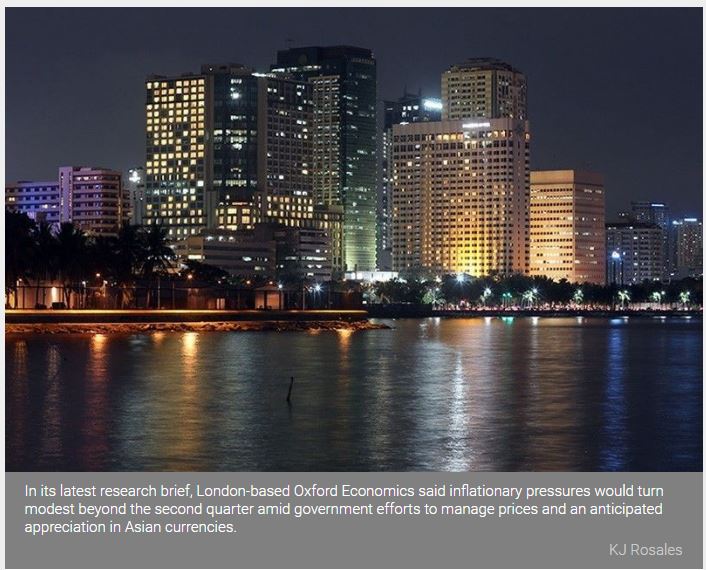Philippines: Inflation seen to taper off in H2
MANILA, Philippines — Inflation in Asia Pacific, including the Philippines, will begin to taper off by the second half of the year as supply side disruptions are slowly addressed.
In its latest research brief, London-based Oxford Economics said inflationary pressures would turn modest beyond the second quarter amid government efforts to manage prices and an anticipated appreciation in Asian currencies.
Strong global recovery prospects, surging prices for crude oil and other commodities, supply-side disruptions, and rising container shipping costs all contributed to the high inflation among countries in the region.
In fact, inflation in the Philippines quickened for the fifth straight month in February to a new two-year high of 4.7 percent as prices of meat and oil products continue to rise.
Economist Priyanka Kishore emphasized that inflation concerns do not seem pronounced at the moment even amid high level price spikes in Hong Kong, Taiwan, South Korea, Singapore, Malaysia and the Philippines since the start of the year.
She said sequential core inflation momentum is expected to pick up as economies recover from the devastating blow to demand that the strict lockdowns have dealt.
“We also see scope for a temporary surge in prices in some categories, especially in services that have lagged the headline GDP (gross domestic product) recovery and could still benefit from pent-up demand,” Kishore said.
“However, we think concerns of a sustained and substantial rise in inflation are overdone. Headline inflation is either below central bank targets or within their range in all Asian economies,” she said.
Further, economies that re-imposed stricter measures to contain surging COVID-19 cases like the Philippines are likely to witness a drawn-out recovery and should keep a lid on core inflation.
Kishore also said the direct impact of rising oil prices and other raw materials is likely to be felt more on the producer price index, which has picked up sharply in recent months.
“Generalized price pressures would feed into core consumer inflation, but not overwhelmingly,” she said.
“We also see scope for governments to impose price ceilings, manage exports, boost imports, and adjust administered prices to contain risks of runaway food and fuel inflation,” Kishore said.
Source: https://www.philstar.com/business/2021/03/25/2086726/inflation-seen-taper-h2


 Thailand
Thailand




